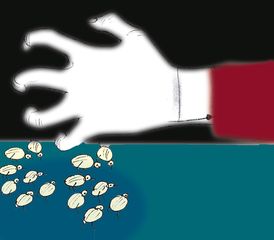Oh, utopia exists. At least in our minds. But dystopia comes and goes, in different countries, in different eras, in different hideous forms. Now we are in “Technopia”—a world re-engineered by the omnipresent Big Tech. Their complicity in surveillance, data theft, disinformation, addictive click-baiting algorithms and unfair competition persists. The worry now is Big Tech’s corrupting influence on authorities—everywhere. European Union’s whistleblowers warn that tech companies are “subverting” democracy. They have spun out of democratic control; they have “captured” governments.
The EU has been relatively corruption-free and firm in bringing corporates to heel. Unimpressed by Big Tech’s menacing growls and chest beating, the EU regulated the tech industry somewhat, earning the regulators’ “best in class” title. While the EU has curtailed privacy invasion, critics allege it has been susceptible, like other governments, to Big Tech’s charm offensives intended to shape new regulations to its advantage.
These dangles include innocuous treats like exclusive access to laboratories, Alpine spas, riding in self-driving cars and having gizmos like the latest augmented reality eyewear. Suddenly, grey-suited bureaucrats swagger like cool dudes with computers on their noses. But most corrupting is tempting offers of lucrative jobs or consultancies for term-ending officials. Top political leaders and bureaucrats in the UK and EU became lobbyists for Big Tech.
Critics say Big Tech is imitating the American tobacco lobby’s unconscionable playbook of purchasing legislators, lawyers, journalists and academics to pressure authorities against banning the sale of cancer-inducing cigarettes. Big Tech spawns dozens of similar “astroturf” organisations—fake “grassroots” groups whose real financial sponsors are tech companies. They have financed astroturf organisations that falsely represent citizens and small businesses to thwart proposed EU laws to regulate Big Tech. Six decades of fighting Big Tobacco teaches that industry interference is the biggest barrier to effective regulation.
Tech power arises from innovation and financial strength, but also from government’s leniency, acts of omission and incapacity. Whistleblowers say, “If Big Tech has taken control, it is because we let them.” It’s not a level playing field: public authorities lack Big Tech’s algorithms and datasets. Whistleblowers’ prescriptions include: The EU must build independent technical agencies that analyse data and assess risks in real time. After the 2008 financial crisis, the EU acquired strong powers to investigate and prosecute financial fraud; it must acquire powers “to prosecute fraud on democracy”. The EU set up “Finance Watch”, an NGO that researched and advocated financial regulation. A “Tech Watch” should now be established. Governments must fund independent think tanks. When Big Tech are the main funders, research will be skewed.
Technopia combines utopia and dystopia. It has enriched lives, spread knowledge, connections and opportunities in ways that were unimaginable a decade ago. It helps to generate income, deliver harvests to markets and save costs. But without adequate regulation, Technopia will be more dystopia than utopia, polarised echo chambers bubbling with hatred, scams, disinformation, disparities and inequities. But astroturf campaigners furiously attack tax and regulation. Monopolistic Big Tech’s money and power to monitor, manipulate and monetise citizens have amplified.
Big Tech’s conquests mean Technopia is the biggest federation in the world. Google alone is used by more than half the planet’s eight billion population. The market capitalisation of just the “Big Five” tech companies—Apple, Google, Amazon, Facebook, Microsoft—is $9 trillion, making it the third largest economy, after the US and China. Imagine Technopia, not as a corporate entity, but as the biggest, most powerful country in the world, with legions here, there and everywhere.
Pratap is an author and journalist.


